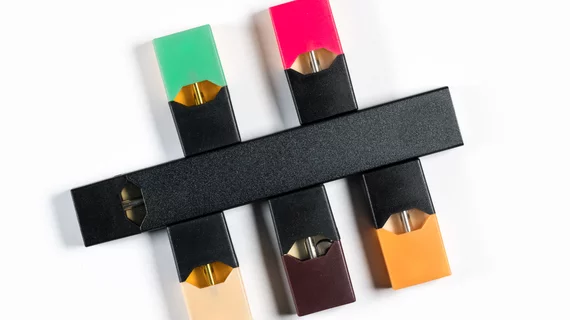The Trump administration has moved forward with a partial ban on some e-cigarette flavors in an attempt to limit the widespread usage of the products with young people. However, the FDA described the policy priorities not as a ban, as the agency has accepted and begun reviewing applications for flavored e-cigarette products.
Specifically, the FDA issued a policy prioritizing enforcement against fruit and mint flavored vaping products. Companies are required to stop manufacturing, distributing and selling these flavored cartridge-based e-cigarettes within 30 days or face FDA enforcement actions. The ban does not cover menthol or tobacco flavors.
The ban was expected after President Trump announced in September he planned to ban all non-tobacco flavored e-cigarette products. It was prompted by a public health crisis after thousands were diagnosed with a lung illness as a result of vaping. The CDC named the illness, e-cigarette, or vaping, product use associated lung injury (EVALI), and the agency pinpointed vitamin E acetate as a potential chemical of concern in the epidemic, though it is still not sure the exact cause of the illnesses.
In addition, vaping has lured a younger generation into tobacco use. More than 5 million U.S. middle and high school students are current e-cigarette users, according to the 2019 National Youth Tobacco Survey.
“By prioritizing enforcement against the products that are most widely used by children, our action today seeks to strike the right public health balance by maintaining e-cigarettes as a potential off-ramp for adults using combustible tobacco while ensuring these products don’t provide an on-ramp to nicotine addiction for our youth,” HHS Secretary Alex Azar said in a statement announcing the ban. “We will not stand idly by as this crisis among America’s youth grows and evolves, and we will continue monitoring the situation and take further actions as necessary.”
The American Medical Association was supportive of the ban as a first step but wants to see more action.
"The AMA is disappointed that menthol flavors–one of the most popular–will still be allowed, and that flavored e-liquids will remain on the market, leaving young people with easy access to alternative flavored e-cigarette products,” Patrice A. Harris MD, MA, president of the AMA, said in a statement.
The announcement specifies that electronic nicotine delivery systems (ENDS), including e-cigarettes and e-liquids, will fall under the policy. The FDA will also pursue enforcement action against ENDS products for which manufacturers failed to prevent minors’ access and any ENDS products targeted toward minors. The FDA will further prioritize enforcement against all ENDS products––flavored, non-flavored, tobacco and menthol-flavored––where the manufacturer fails to take adequate measures to prevent youth access.

